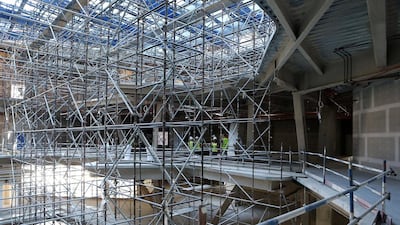Emirates NBD, Dubai’s largest lender by assets, lowered its forecast for economic growth in the UAE this year to 2 per cent from 3.4 per cent.
It pointed to the expected impact on growth from the extension of an oil output restraint deal agreed by Opec and a group of countries led by Russia.
Khatija Haque, the head of Middle East and North Africa research at Emirates NBD, said in a report that the decision in May to extend production curbs until March 2018 to shore up crude prices has led the bank to revise down its 2017 real GDP growth forecast for the UAE.
“Our expectation for a rebound in the non-oil sectors this year remains unchanged,” she said.
While there has been pessimism surrounding oil prices of late after crude entered a bear market amid an increase of supply globally, there is optimism about the non-oil economy of the UAE due to a rise in global trade as well as investment into infrastructure ahead of Dubai’s hosting of Expo2020.
As a result, the non-oil economy will rebound this year, the IMF said in May.
Non-oil GDP is forecast to expand by 3.3 per cent this year with the budget deficit shrinking to 4.5 per cent of GDP, it said.
The IMF in April lowered its overall forecast of growth for the region, on the assumption that the oil output deal would trim production of regional crude. The IMF expects real GDP growth for the seven oil-exporting countries in the Middle East of 1.9 per cent this year, which is a full percentage point lower than the 2.9 per cent growth it forecast for the group in October.
Although fiscal deficits in the region are narrowing as governments trim spending and introduce new revenue streams such as value-added tax, there are dim prospects for double-digit surpluses.
In response to the economic slowdown, governments and companies have cut back on spending on projects and slowed hiring. Consumers became cautious about spending money, further dampening growth. However, business confidence in the emirates has improved.
That’s made many observers optimistic about a rebound in economic growth in 2018. The Egyptian investment bank EFG-Hermes said in May that it expects the UAE’s GDP growth next year to 3 per cent on the back of improvement in the non-oil economy. For this year however, the investment bank expects economic growth to slip to 1.1 per cent.
The UAE’s economy grew 3 per cent in 2016, down from 3.8 per cent the previous year, in the wake of a lull in non-oil economic growth, according to the Federal Competitiveness and Statistics Authority.
That slowdown was in line with the expectations of economists, many of whom see a further slowdown this year, amid lacklustre oil prices and an extension of the production cuts.
mkassem@thenational.ae

